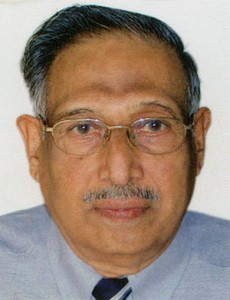I remember vividly the midnight hour on 14/ 15 August , 1947 when India became free. I was in Delhi right in the midst of historic happenings, but as a fifteen year school boy, I guess I didn’t quite realise that history was being made right in front of my eyes. My uncle, aunt and I huddled around our radio set around 10.30 pm to tune in to All India radio, the only broadcast medium we had in those days. The radio commentary started around that time and at 11 pm the Constituent Assembly met.
We heard Mrs Sucheta Kripalani sing Vande Mataram- the original version, which to this day sounds to me sweeter than all the later ones. The President of the Constituent Assembly, Dr Rajendra Prasad, then spoke. And that was followed by Nehru’s seminal address-counted among the great speeches of our time-with the words, “ At the stroke of the midnight hour, when the world sleeps, India will awake to life and freedom.”. He added “A new star rises, the star of freedom in the East, a new hope comes into being… May the star never set, may that hope never be betrayed!” Nehru spoke of India’s determination to work with the nations of the world to promote peace, freedom and democracy. It touched a chord in our hearts and in millions of hearts because it ignited a new hope and a sense of strange, indescribable ecstasy. There were other speeches and then Jana Gana Mana, which had not yet become the national anthem!
From what the radio commentators said, all Delhi was awake . I guess most of India was awake!
The next morning, I had to be up early, to rush to my school for our celebration of the day. We had the march past, Vande Mataram and the unfurling of the flag and an emotional speech from the Principal followed by Jana gana mana and generous distribution of sweets.
We were now free men and freedom brought responsibility , our Principal reminded us. Words like peace, freedom and democracy resonated in my mind as I started walking back home . It was a two kilometre walk from school to home. And I had with me my friend Vijayendar who lived not far away from our house. Half way down the walk, we suddenly heard a shriek, a scary one and noticed a distant shadowy figure chasing a hapless victim, mercifully invisible to me. We sensed danger and I shivered in silence till I reached home.
In another part of New Delhi , celebrations were in full swing. Independence was heady wine at least for the moment and thousands of men , women and children had gathered around the Viceroy’s house, ( now Rashtrapathi Bhavan), Great Place ( now Vijay Chowk) and India Gate to see the illuminations and the great march with Lord Mountbatten and Nehru moving all the way to India Gate in the Viceroy’s open carriage drawn by six horses. I too moved around in the crowd, in what was being described as a sea of humanity ; our house was only ten or fifteen minutes away from these happenings.
I returned home late in the evening. My aunt was anxiously waiting for me.The riots had started!
Yes, the riots had started! We had independence but peace had eluded us!
In yet another part of Delhi, near Safdarjung Jung, one refugee camp was sheltering a few thousand ‘ sharanarthis’, men, women and children, victims of partition uprooted from their homes, who had lost everything and had to flee across the border in sheer search of safety.
The refugee camp was organised overnight and was full to the brim , without even basic amenities like water, sanitation and food. Cholera was a real possibility. The place was seething with anger and bitterness. It was an explosive situation.
What stressed us more was that my uncle had to go into this camp and almost take personal responsibility for its hygiene and health issues. We were no doubt proud of the fact that he had just been promoted, to become the first Indian to hold the highest position in public health administration in India, that of the Director General of Health Services but we didn’t expect this to land him so suddenly in a situation where his personal safety became our greatest concern. (One has to remember that in those days even ministers had none of the security shields that they have today.)His visits to the camp continued, I think, for about a month.
We thus had two streams incongruous with each other : one, the stark reality of facing one of the most colossal upheavals in history, caused by partition and the mass migration of population; and the other , the mood of joy and hope that pulsated through the celebrations. I guess, in a small measure, I was witness to both on that day and in the months that followed .The second, the hope of a better future has remained and has fortunately propelled us to great endeavours and glorious achievements..
We have come a long way from that Independence Day! Each year brings fresh hope and a fresh sense of pride in being an Indian!
[After I wrote this piece, I tuned in to Prime Minister Narendra Modi’s speech at the Red Fort. The ninth in a row. As always, with telling takeaways. Specially appealing to me was his plea for reconnecting with our cultural roots and for a sense of pride in them. And his words, “ We must not seek validation from the world. ” Too often we have to wait for validation abroad before gaining recognition at home!]
.




















Join my Network